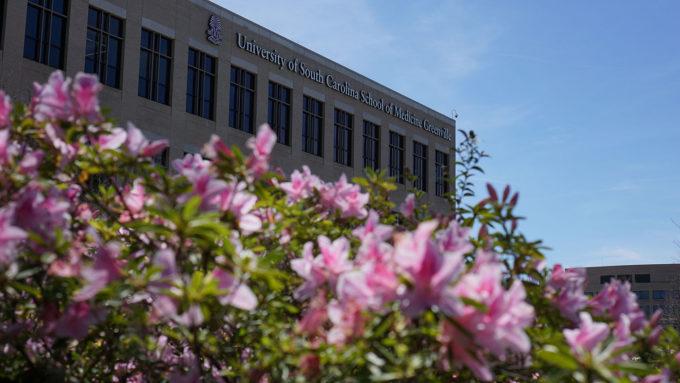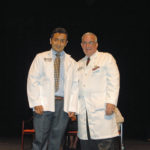
Get the latest articles delivered directly to your inbox!
Our Contributors
Class of 2022
Kyle Duke
Austin Foster
Charlotte Leblang
Ross Lordo
Class of 2021
Dory Askins
Connor Brunson
Keiko Cooley
Mason Jackson
Class of 2020
Megan Angermayer
Carrie Bailes
Leanne Brechtel
Hope Conrad
Alexis del Vecchio
Brantley Dick
Scott Farley
Irina Geiculescu
Alex Hartman
Zegilor Laney
Julia Moss
Josh Schammel
Raychel Simpson
Teodora Stoikov
Anna Tarasidis
Class of 2019
Michael Alexander
Caitlin Li
Ben Snyder
Class of 2018
Alyssa Adkins
Tee Griscom
Stephen Hudson
Eleasa Hulon
Hannah Kline
Andrew Lee
Noah Smith
Crystal Sosa
Jeremiah White
Jessica Williams
Class of 2017
Carly Atwood
Laura Cook
Ben DeMarco
Rachel Nelson
Megan Epperson
Rachel Heidt
Tori Seigler
Class of 2016
Shea Ray
Matt Eisenstat
Eric Fulmer
Geevan George
Maglin Halsey
Jennifer Reinovsky
Kyle Townsend
Join USCSOMG students on their journeys to becoming exceptional physician leaders.

A Familial Foundation
Leading up to Giving Day, I’ve been reflecting on how the generosity and sacrifices of others have influenced not only my decision to pursue a career in medicine, but also to persevere when things go south. My parents played a crucial role in making this reality possible, and I will forever be grateful to them. But last year, thanks to the UofSCSOMG Benevolence Fund (student emergency fund), I was able to visit two additional people in Mexico whom I respect deeply and were instrumental in setting the foundation for my medical career: my grandparents. Having the opportunity to spend time with my grandparents in the town of La Cañada Michoacán, Mexico, my birthplace, gave me greater insight into the chain of events that would ultimately lead to the start of my education in the United States.
In 1986, Ronald Reagan signed the Immigration Reform and Control Act (IRCA), which legalized various seasonal agricultural undocumented immigrants, such as those working in the perishable industry. At the time, my dad was 18 years old and working as an undocumented tobacco picker in North Carolina. Since tobacco was considered a perishable good, my dad was able to apply for legalization through IRCA. He would work for nine months in the U.S. and spend three months in Mexico with us. As a result, the only consistent male figure in my life was my maternal grandpa.
My grandpa always worked hard to ensure that his family had the best possible chance for professional and economic improvement. He arrived in the States under the 1942 “Bracero Program,” which brought Mexican laborers to the United States to remedy wartime production shortages caused by World War II. When millions of Mexicans began immigrating to the U.S. during that time, the disruption in both country’s governments led to a mass deportation operation officially called “Operation Wetback.” As a result of political tension among other key factors, the “Bracero Program” ultimately ended in 1964. Thereafter, my grandpa returned home to La Cañada, Michoacán. La Cañada is a humble, simple town with an estimated population of 895 and the barest of essentials: a school, a church, and one doctor.
My grandpa helped my mother raise me from a young age. He always reinforced the importance of respecting my parents and pursuing an education. He said that “obtaining a good education is a privilege. It will open doors and allow you to see things many cannot.” My grandpa was supportive of my schoolwork and would find ways to help me earn 10 pesos, or about 50 cents, by giving me simple tasks like picking lemons from his trees. Even though I would try to refuse his payment, he encouraged me to buy school supplies. “I knows it’s not worth much, but accept it and buy something nice. I’m not giving it to you; you earned it.”
In 2000, the U.S. passed the Legal Immigration and Family Equity Act (LIFE Act). The goal was family reunification by allowing family members of permanent legal U.S. residents to legally move to the U.S. from Mexico. By the end of 2003, my mom and I were living in Wake Forest, North Carolina with my dad. Even though Dad had been absent for most of my childhood, I already understood the significance of the sacrifice he made to come to the U.S. Year after year, I slowly began to adapt, advancing through the American education system and ultimately enrolling in medical school in 2016.
In late 2018, I began my eight-week-long internal medicine rotation. But throughout those weeks, I was constantly worrying about my grandparents’ declining health. My grandmother had a medical emergency during the summer, followed by my grandpa’s increasing high blood pressure and uncontrolled diabetes. I felt resentment towards some of the patients I encountered during my rotation because they, not my grandparents, were able to get treatment for their medical conditions. I knew my feelings were insensitive and biased stemming from personal concerns, and I couldn’t help also feeling guilty that I often took for granted access to basic medical resources. After those eight long weeks, my mom and I flew down to Mexico to see my grandparents again. This visit in December was different; I knew it would be the last time I would ever be with them. I was committed to spending all of my time with them and learning everything I could about their lives. In doing so, I found greater insight than ever before into my grandparents’ history, and a permanently altered outlook on my life in the U.S.
During his time working for the “Bracero Program,” 10 percent of my grandpa’s compensation was automatically sent to the Mexican banks as part of his retirement plan. However, the Mexican banks never distributed any of that money resulting in a national lawsuit. In 2006, Mexico agreed to pay the equivalent of $3,500 dollars to workers who could prove they were hired under the “Bracero Program.” In 2018, my grandpa finally received his hard-earned money, and it was during this last visit that I was able to help him withdraw his pay from the government. Going to a bank twenty minutes away from La Cañada was not a simple errand as Mexico was going through a gas crisis and my grandpa lost most of his vision due to diabetes. I guided him ensuring that he didn’t fall, and counted his money, which he struggled to see or hold due to his essential tremor. Upon our return home, my grandparents gave me 500 pesos ($25) as a form of “payment” for helping grandpa that day. I refused, but grandpa replied the way he always did: “I knows it’s not worth much, but accept it and buy something nice. I’m not giving it to you; you earned it.”
As the trip came to an end, I knew this would be the last goodbye I would give in person. I thanked my grandparents for everything they had done for us and gave them the last hug. It was the first time I had seen Grandpa cry. I didn’t have the courage to look him in the eyes and say goodbye. Instead, I told him that all the money he had helped me earn throughout my life, starting with those pesos for picking lemons from trees, had indeed allowed me to buy something nice: the American Dream.
I left knowing that my grandparents’ multiple medical issues were being managed as best as possible considering their limited access to resources. After returning to the States and starting my psychiatry and neurology rotation, my feelings of anger and resentment began to resurface. However, this time they were tempered by the gratitude and respect I felt toward my grandpa’s legacy. I acknowledged that my grandpa would never benefit from the resources of the healthcare system that I am a part of, yet the purpose of all he had sacrificed was to afford me the opportunity to continue my education and reach places like medical school. Now I understand what he was referring to when he said that “obtaining a good education will allow you to see things many cannot.” As a medical student, I’ve had the privilege of many unique experiences, ranging from being in an operating room and seeing the inner workings of the human body to witnessing patients at their most vulnerable moments while receiving devastating diagnoses. I had been taking these privileges for granted.
Thanks to the donors who contributed and will contribute to the Benevolence & Student Emergency Fund at UofSCSOMG. As a result, the financial strain associated with traveling to Mexico was lessened for me and my family. You never know just how much a small donation can touch another person’s life. I encourage you to donate today, as I know that donation will help another student buy something nice.

Jesus Avila Vega, Class of 2020
Copyright 2021 USC School of Medicine Greenville

